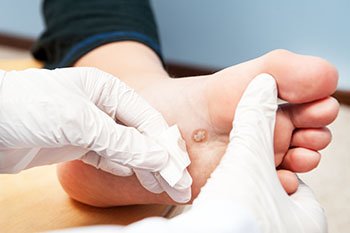Most plantar warts, warts that develop on the bottom of the foot, go away after months or years on their own. However, as these warts can cause pain and discomfort, and because they are contagious and can spread easily, a doctor may recommend or prescribe various treatments and at home care techniques to help you find relief. To treat a foot wart, your doctor may prescribe a topical medication, which you must use exactly as prescribed for best results. You may also take an over-the-counter pain medication to reduce pain from the wart. Wearing comfortable shoes and socks, and padding the wart by wearing a doughnut-shaped felt or moleskin bandage, may also help relieve pain by reducing pressure placed on the wart. For the best treatment options, consult with a podiatrist today.
Plantar warts can be very uncomfortable. If you need your feet checked, contact Dr. Yeon A. Shim from Roselle Podiatry Group. Our doctor will assist you with all of your foot and ankle needs.
About Plantar Warts
Plantar warts are the result of HPV, or human papillomavirus, getting into open wounds on the feet. They are mostly found on the heels or balls of the feet.
While plantar warts are generally harmless, those experiencing excessive pain or those suffering from diabetes or a compromised immune system require immediate medical care. Plantar warts are easily diagnosed, usually through scraping off a bit of rough skin or by getting a biopsy.
Symptoms
- Lesions on the bottom of your feet, usually rough and grainy
- Hard or thick callused spots
- Wart seeds, which are small clotted blood vessels that look like little black spots
- Pain, discomfort, or tenderness of your feet when walking or standing
Treatment
- Freezing
- Electric tool removal
- Laser Treatment
- Topical Creams (prescription only)
- Over-the-counter medications
To help prevent developing plantar warts, avoid walking barefoot over abrasive surfaces that can cause cuts or wounds for HPV to get into. Avoiding direct contact with other warts, as well as not picking or rubbing existing warts, can help prevent the further spread of plantar warts. However, if you think you have developed plantar warts, speak to your podiatrist. He or she can diagnose the warts on your feet and recommend the appropriate treatment options.
If you have any questions please feel free to contact our office located in Roselle, NJ . We offer the newest diagnostic and treatment technologies for all your foot and ankle needs.

